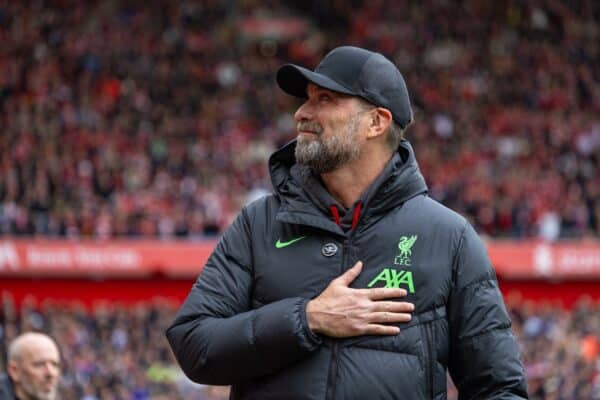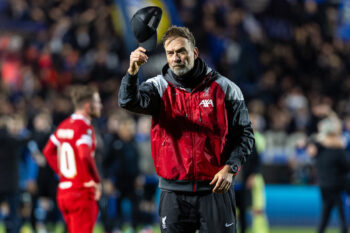There’s been much speculation over Liverpool seeking to bring Divock Origi to Merseyside six months earlier than previously agreed with Lille – Brett Curtis explains why it would be best for both clubs and the player.

With Daniel Sturridge suffering yet another injury setback, which will keep him out until the New Year at least, attention has turned to 19-year-old Divock Origi as the answer to Liverpool’s problems.
The Belgian forward, one of the surprises of the World Cup, signed for the Reds from Lille in July on a five-year contract for a fee in the region of £10 million.
As part of the agreement, however, he was loaned back to the French side for a season to continue his development.
The logic, then, was assumedly that the already-signed Rickie Lambert would fill his space as third-choice forward for a year, with Sturridge and another signing (which turned out to be Mario Balotelli) starting most games.
When forgotten man Fabio Borini refused moves to Sunderland and QPR in order to fight for his place, Liverpool looked more than sufficiently stocked in the striking department.
But, sometimes, depth can be misleading.
A shop can have as much stock as it likes, but if it is not being turned into something tangible, then it becomes worthless, at least in the short-term.
That is the issue Liverpool have discovered this season.
Sturridge hasn’t played since August – yet he still has more Premier League goals this season than Balotelli, Lambert and Borini combined.
That is cheeky, of course: even I’ve scored as many as the trio, and so have you. Origi, too. But it is also undeniably telling.
With 14 league goals, Liverpool have scored only as many as Sunday’s opponents, Crystal Palace, a side they scored over three times more than last season.
The main argument against bringing the Belgian back early, from a fan perspective, seems to be that it would put his young shoulders under too much pressure.
But, actually, how can he do any worse than the current lot?
And what if he had been signed in the summer under normal circumstances anyway?
Yes, there would be big expectation should he return early.
But there is for every Liverpool player, and he will have to get used to it at some point. Giving him a six-month head-start to do so—as well as adapting to a new country—seems highly logical, and it would also diminish the need to go and sign another short-term solution instead.
Yes, he would not develop as quickly in this current Liverpool side as last season’s swashbuckling one.
But it would surely be better than staying at Lille, the lowest scorers in the French top-flight and currently closer to the relegation zone than a top-six spot.
Andrew Gibney, editor of French Football Weekly, recently wrote of the forward: “Too often his head has looked elsewhere and he looks like a player who is mentally already playing his football at Anfield.”
The player himself essentially confirmed as much: “Maybe January, who knows? I would like to join Liverpool then… I can’t wait to be playing in the Premier League because I can now see that it will suit me better.”
Brendan Rodgers, meanwhile, is reportedly in regular contact and was quoted in October as saying: “We believe he will be world-class… he could play for Liverpool now. He can run in behind, he can press and he can keep the ball.”
Those qualities have been sorely missed in the presence of Lambert and Balotelli.
Clearly, then, Rodgers would like Origi as an option in January, and the player himself wants the same outcome.
So what’s stopping it happening?
Lille.
In the summer of 2013, Liverpool knew their chances of securing a Champions League place would be ruined by selling Luis Suarez to a top-four rival.
They rightly held firm.
For Lille, the fear regarding letting Origi leave early would be that it could propel them into an unforeseen relegation battle, having secured a Champions League place in three of the last four seasons themselves.
In truth, however, that prospect is surely as unlikely as European qualification.
If the player himself wants out, are they not better building for the future in a season which increasingly looks like a write-off?
Besides, with three goals and an assist in 11 games, it is not as if the 19-year-old is performing so brilliantly they cannot afford to lose him.
A few extra million could even allow the French outfit—which loses 9 million euros a year on the newly-built State Pierre-Mauroy stadium–to sign a slightly higher-calibre replacement than previously budgeted for.
For Liverpool, the right decision would have been to use the £4 million spent on Rickie Lambert more shrewdly, i.e. by tempting Lille into selling Origi permanently in the summer.
But hindsight is 20/20, and credit must go to the hierarchy for seemingly looking to rectify a mistake.
With Liverpool, Lille and Origi all struggling, it seems inevitable it will happen once the transfer window mayhem re-opens.
And it might just work out best for all involved.
Brett Curtis


















Fan Comments